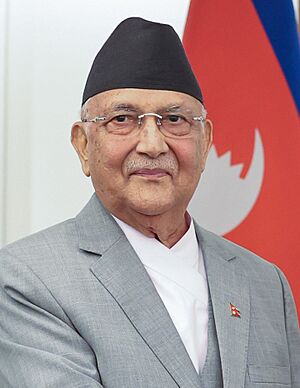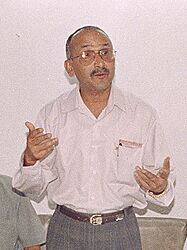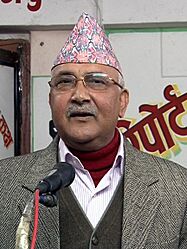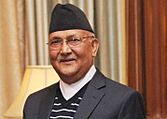K. P. Sharma Oli facts for kids
Quick facts for kids
K. P. Sharma Oli
|
|||||||||||||||||||||||||||||||||||||||||
|---|---|---|---|---|---|---|---|---|---|---|---|---|---|---|---|---|---|---|---|---|---|---|---|---|---|---|---|---|---|---|---|---|---|---|---|---|---|---|---|---|---|
| के.पी. शर्मा ओली | |||||||||||||||||||||||||||||||||||||||||

Oli in 2025
|
|||||||||||||||||||||||||||||||||||||||||
| 38th Prime Minister of Nepal | |||||||||||||||||||||||||||||||||||||||||
| Assumed office 15 July 2024 |
|||||||||||||||||||||||||||||||||||||||||
| President | Ram Chandra Poudel | ||||||||||||||||||||||||||||||||||||||||
| Deputy | Bishnu Prasad Paudel Prakash Man Singh |
||||||||||||||||||||||||||||||||||||||||
| Preceded by | Pushpa Kamal Dahal | ||||||||||||||||||||||||||||||||||||||||
| In office 15 February 2018 – 13 July 2021 |
|||||||||||||||||||||||||||||||||||||||||
| President | Bidya Devi Bhandari | ||||||||||||||||||||||||||||||||||||||||
| Preceded by | Sher Bahadur Deuba | ||||||||||||||||||||||||||||||||||||||||
| Succeeded by | Sher Bahadur Deuba | ||||||||||||||||||||||||||||||||||||||||
| In office 12 October 2015 – 24 August 2016 |
|||||||||||||||||||||||||||||||||||||||||
| President | Ram Baran Yadav Bidya Devi Bhandari |
||||||||||||||||||||||||||||||||||||||||
| Preceded by | Sushil Koirala | ||||||||||||||||||||||||||||||||||||||||
| Succeeded by | Pushpa Kamal Dahal | ||||||||||||||||||||||||||||||||||||||||
| Leader of the Opposition | |||||||||||||||||||||||||||||||||||||||||
| In office 27 February 2023 – 4 March 2024 |
|||||||||||||||||||||||||||||||||||||||||
| Prime Minister | Pushpa Kamal Dahal | ||||||||||||||||||||||||||||||||||||||||
| Preceded by | Sher Bahadur Deuba | ||||||||||||||||||||||||||||||||||||||||
| Succeeded by | Sher Bahadur Deuba | ||||||||||||||||||||||||||||||||||||||||
| In office 13 July 2021 – 26 December 2022 |
|||||||||||||||||||||||||||||||||||||||||
| Prime Minister | Sher Bahadur Deuba | ||||||||||||||||||||||||||||||||||||||||
| Preceded by | Sher Bahadur Deuba | ||||||||||||||||||||||||||||||||||||||||
| Succeeded by | Sher Bahadur Deuba | ||||||||||||||||||||||||||||||||||||||||
| In office 4 August 2016 – 15 February 2018 |
|||||||||||||||||||||||||||||||||||||||||
| Prime Minister | Pushpa Kamal Dahal Sher Bahadur Deuba |
||||||||||||||||||||||||||||||||||||||||
| Preceded by | Sushil Koirala | ||||||||||||||||||||||||||||||||||||||||
| Succeeded by | Sher Bahadur Deuba | ||||||||||||||||||||||||||||||||||||||||
|
|||||||||||||||||||||||||||||||||||||||||
|
|||||||||||||||||||||||||||||||||||||||||
|
|||||||||||||||||||||||||||||||||||||||||
| Personal details | |||||||||||||||||||||||||||||||||||||||||
| Born |
Khadga Prasad Sharma Oli
22 February 1952 Iwa, Kingdom of Nepal |
||||||||||||||||||||||||||||||||||||||||
| Political party | CPN (UML) (1991–2018; 2021–present) | ||||||||||||||||||||||||||||||||||||||||
| Other political affiliations |
|
||||||||||||||||||||||||||||||||||||||||
| Spouse |
Radhika Shakya
(m. 1987) |
||||||||||||||||||||||||||||||||||||||||
| Parents |
|
||||||||||||||||||||||||||||||||||||||||
| Signature |  |
||||||||||||||||||||||||||||||||||||||||
Khadga Prasad Sharma Oli (born 22 February 1952), often called K. P. Sharma Oli, is a politician from Nepal. He is the current prime minister of Nepal, a job he started on 15 July 2024.
Oli is the Chairman of the Communist Party of Nepal (Unified Marxist–Leninist). He has served as prime minister several times before. He is also a Member of Parliament for the Jhapa 5 area.
Many people in Nepal see him as a strong leader. He stood up to India during a border blockade in 2015. He also worked to build a better relationship with China. His government updated Nepal's official map to include lands also claimed by India. However, some people have criticized him for his style of speaking and for how he has run the government.
Contents
Early Life and School
K.P. Sharma Oli was born on 22 February 1952, in a village called Iwa in Tehrathum, Nepal. His father, Mohan Prasad Oli, was a farmer. His mother, Madhumaya Oli, sadly died from smallpox when he was only four years old.
His family later moved to a place called Jhapa. He finished his high school exams in 1970. During his time in Jhapa, he became interested in politics and was inspired by his uncle, Ramnath Dahal, to learn about communism.
Start of His Political Career
When he was 18, Oli joined a political group. Because of his political activities against the government at the time, he was arrested in 1973. He spent the next 14 years in prison.
While in jail, he became an important member of the CPN (Marxist–Leninist). After he was released in 1987, he became very active in the party.
Becoming a Member of Parliament
In 1991, Oli's party joined with another to become the CPN (UML). In the 1991 election, he was elected to parliament.
He was re-elected in the 1994 election and became the Home Minister. This made him responsible for the country's police and internal security. He was elected to parliament again in the 1999 election.
In 2006, after major political changes in Nepal, Oli was appointed as Deputy Prime Minister and Foreign Minister.
Serving as Prime Minister
In 2015, Oli was elected as the leader of his party, CPN (UML). This was a big step in his career.
First Time as Prime Minister (2015–2016)
On 11 October 2015, Oli was elected Prime Minister of Nepal for the first time. This was a difficult period for Nepal because of protests and a blockade at the border with India, which stopped supplies from coming into the country.
During this time, Oli's government worked to improve relations with China. They signed trade and travel agreements to create more options for Nepal. He resigned in July 2016 after some political parties in his government withdrew their support.
Second and Third Times as Prime Minister (2018–2021)
In the 2017 election, Oli's party and its partners won a majority of seats. He became prime minister for the second time on 15 February 2018. His party later merged with another to form the Nepal Communist Party.
During this term, his government faced the COVID-19 pandemic. In May 2020, his government updated Nepal's map to include disputed territories like Kalapani, Lipulekh, and Limpiyadhura. This was a popular decision in Nepal but caused tension with India.
Oli faced challenges within his own party. On 20 December 2020, he decided to dissolve the parliament and call for new elections. However, the Supreme Court said this was unconstitutional and restored the parliament.
In May 2021, he lost a vote of confidence in parliament. He was then appointed as a minority prime minister. But in July 2021, the Supreme Court ordered that Sher Bahadur Deuba be appointed as the new prime minister.
Fourth Time as Prime Minister (2024–Present)
In the 2022 general election, Oli's party became the second-largest in parliament. After a period of changing political partnerships, Oli and the Nepali Congress party agreed to form a new government together.
On 14 July 2024, Oli was appointed prime minister for the fourth time. He was sworn into office the next day.
Political Views
Oli's political ideas were shaped by his early life experiences. He has been critical of using violence to achieve political goals.
Relationship with India
Oli's relationship with India has had its ups and downs. Early in his career, he supported a treaty with India, which some saw as being too friendly to India.
However, as prime minister, he often took a strong stand to protect Nepal's interests. During the 2015 blockade, he looked to China for help. He also challenged India over border disputes. In 2020, he said that the "Indian virus" was more dangerous than others, blaming people crossing the border from India for spreading COVID-19 in Nepal.
Ideas on History and Culture
Oli has made some interesting claims about history. In July 2020, he said that the Hindu god Rama was born in Nepal, not India, and that the real Ayodhya was near Birgunj in Nepal.
In 2021, on International Day of Yoga, he claimed that yoga started in Nepal and Uttarakhand, not in the modern country of India, because India did not exist as a nation back then.
Personal Life
Oli is married to Radhika Shakya. They met in 1987 and got married in a small ceremony later that year. He lives in Balkot, Bhaktapur, but also has a home in Jhapa.
Health
Oli has had health problems for many years. He had tuberculosis during his time in prison. He has also had issues with his kidneys and has had two kidney transplants, one in 2007 and another in 2020.
See also
 In Spanish: Khadga Prasad Oli para niños
In Spanish: Khadga Prasad Oli para niños




